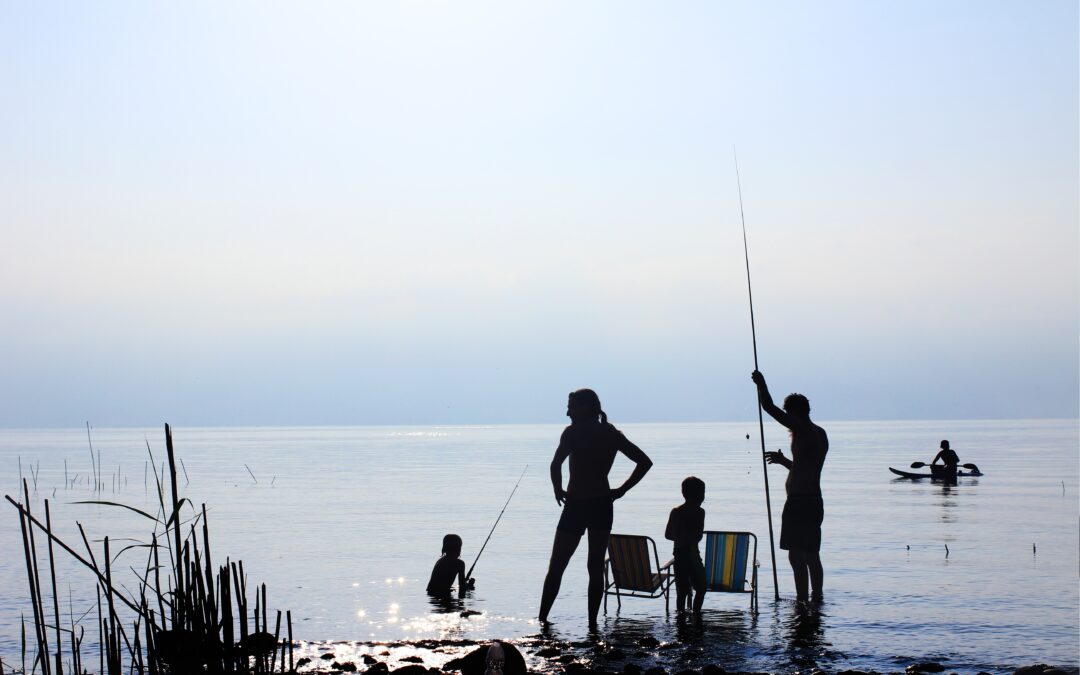As summer approaches, many families look forward to a family vacation where they can escape from the relentless demands of the school year. Sadly, the jarring disconnect between expectations and the reality of traveling with kids leaves many parents wishing they had never left home.
This is especially true for families with kids who struggle with flexibility, self-regulation, sensory issues, dietary constraints, and other challenges and special needs. For some families managing these issues is so difficult they avoid traveling altogether.
As we head into summer, I thought I’d share some strategies that have helped our kids enjoy vacations; these strategies have also helped families that I work with.
The ideas you will read below are based on the following guiding principles:
- Respect your child’s profile,
- Communicate your plans ahead of time to avoid surprises, and
- Plan for how to handle difficult situations ahead of time.
Involve the Whole Family When Planning
Kids often feel like things just happen to them and that they have no control over the events in their lives. This can happen with vacations when we adults assume that our kids know what we have planned. Not knowing what is coming can be quite anxiety provoking.
One solution is to actively involve your kids in planning the trip. You can ask your kids what their ideal vacation would look like. Do they want to spend time relaxing? Hiking? Riding roller coasters? Swimming? Eating pizza? Petting koala bears? As part of this process, you can tell them what you want to do as well. Kids only know what they have experienced, so you may need to explain what your preferred activities will involve.
It’s important to remember that some kids have trouble getting excited about activities that are unfamiliar. For those kids it will be important to help them become familiar with what will happen ahead of time. (More on that below.)
Structure your vacation to allow time that will help your child to stay regulated. And it’s not just kids who need time to self-regulate – think about what you and those you are traveling with will need.
Vacation activity ideas may include:
- Structured activities with clear expectations
- Scheduled down time away from everyone (this can be important for kids, but also for adult relatives who are easily overwhelmed by kids)
- Activities that are stimulating
- Activities that are not overstimulating
- Activities that get your kids up and moving
- Activities that will not exhaust your child
Note that the activities that will work best for one child may well be different than the activities that are appropriate for another. Choose activities that respect your child’s profile. When he was little, one of our kids was terrified by the sound of the ocean and the other one hated getting dirty. We avoided beach vacations until they were older so we wouldn’t spend the entire vacation being sad that our kids weren’t having a good time.
Think about what is involved in the activities you want to do. If you have a kid who has a hard time standing still and waiting in line, it might be best to avoid going to an amusement park. That kid might enjoy a vacation with regular walks on the beach or in the woods instead. Does your child get overwhelmed by large crowds? You might want to avoid concerts or other crowded venues.
Anticipate and Plan for Difficult Situations
Sometimes it is impossible to avoid situations that you know will be difficult.
For an active child who needs a lot of movement, flying and waiting in an airport can be excruciating. Think ahead of time about what you will do to help them. Perhaps you can plan a longer layover between flights so you can schedule time to run up and down the terminal walkways. Or you can teach your kids how to do chair yoga so they won’t get so antsy while sitting.
Some kids will enjoy helping you choose other activities that will keep them engaged when they have to stay in their seats. One family I know has a set of special activities that they only do when traveling so their kids have something to look forward to.
Identify potential concerns for each part of your trip and think about how you can address them. Your child might suffer from sensory overwhelm while on an airplane or waiting in line at security. We bring earplugs and noise-cancelling headphones to help with noise on the plane, and we have silly games we like to play while we wait in line.
Similarly, your child might find it difficult to ride in an elevator (can you take the stairs? Or stay in a low rise hotel?) or to sleep in an unfamiliar bed (would a familiar blanket, toy or pillow help?).
Safety issues, such as staying close to a parent and not wandering off, can be a huge concern. (I remember thinking that my husband’s mother was crazy for using harnesses to keep track of her three young boys when they had to go out. The minute I had my own children, I realized how smart she was!)
It will also be helpful to think ahead of time about how to help your children when they need time to themselves. My son carries a blanket with him when we fly so he can hide under it when he’s overwhelmed. When we stay with friends or family, we make sure the kids have a quiet room to go to when they need to get away from the rest of us.
Despite the best planning, your child will have moments when they can no longer stay regulated. Think ahead of time about how you are going to handle this.
Ways to manage your child when they can’t stay regulated include:
- Respond with empathy.
- Leave the situation.
- Give a hug.
- Distract.
- ??
Do not allow your child to abuse siblings or other loved ones. If they cannot stay safe, you may need to take them away from the others until they are able to calm down. We tell our kids that it is absolutely okay to have Very Big Emotions, but it is not okay to act those feelings out if it will hurt other people. You will also want to think about what you will tell people outside your immediate family about your plans for handling your child’s difficult moments.
Planning ahead of time for these situations will help everyone be less anxious when the inevitable challenges arise. It’s also important to talk to your traveling companions ahead of time so you all agree on how to help your child in challenging situations.
Help Your Child Know What to Expect
Before we travel, I like to show my kids as many pictures of where we are going as possible. If we’ve rented a house, I will show them the photos on the vacation rental site. If we are signed up for a tour, I will find photos on the tour website that we can go through ahead of time. People often post vacation photos from the places we are traveling to; it can be a lot of fun to look through those so the kids know what to expect. Sometimes I will create a day-by-day itinerary with the activities for each day listed in order and photos to help remind us of what will happen that day.
It can be important to anticipate activities where your child likely has no idea what will happen. For example, as adults we know the sequence of events involved in going to an airport and getting on a plane. But to a child, the entire experience is new and every part of it is unexpected.
When our kids were little, after one perfectly dreadful flight we wrote a social story to help them know what to expect. We read it aloud to them several times before we flew, and while we were going through each step of the process we showed them the page in the story that corresponded to what we were doing. It was incredibly helpful! You can create social stories for all kinds of activities – the Fourth of July, going to the movies, taking a taxi, eating dinner in a restaurant, etc.
If your vacation involves spending time with extended family, it’s important for your children to know who will be around, what kinds of behaviors are expected, and what to do if they are feeling uncomfortable. I’ve found it helpful to adapt the guide to my child for social situations and send it ahead of time to those whom we are vacationing with so they also know what to expect.
Even for very low-key vacations, kids can find it hard to function when they don’t know what to expect each day. For this reason, I recommend posting a rough outline of the day somewhere where your children can see it. Even for a day with no activities, there’s still a routine. For example:
- Wake up
- Breakfast
- Free time
- Lunch
- Free time
- Go for a walk
- Dinner
- Watch the stars
- Bedtime
(or whatever your schedule is). Add times if you think it will help. (We do this with the wake up time, so we can sleep in a bit.) Be careful with times – some kids will hold you to them, and that can create a lot of stress if you aren’t exactly On Schedule. For kids who can’t read, visual schedules can be helpful. And for the “Free Time” entries, you might want to provide a list of activities for your kids to choose from (e.g., read a book, play outside, board games, take a hike, etc.).
Go over the schedule with everyone the night before so there are no surprises during the day and post it somewhere central so your kids can see it when they wake up and refer to it throughout the day.
You Deserve Vacation Time Too
For some families, traveling without kids really may be the best answer. After nearly 20 years of vacations spent accommodating our kids and putting our own dreams on hold, our wonderful brother-in-law watched our boys while my husband and I took a fantastic week-long vacation together. It was heaven.
Accept Your Reality
There’s a quote by Byron Katie that I really love: “When you argue with reality, you only lose 100% of the time.” Planning for a vacation involves truly understanding and acknowledging your reality and that of your children – and planning for it. By anticipating everyone’s needs you can ensure that your vacations are a time for connection that is fun and memorable for everyone.
Image by Adam Sherez via Unsplash
Do you need help with your child? Sarah Wayland can help you figure out how to support your child via classes, Special Needs Care Navigation services, Parent Coaching, or as your certified Relationship Development Intervention (RDI) consultant.
Share this post on Pinterest!


Hi Sarah! These are such great tips! We travel on a beach vacation every year with two other families, and while enjoyable, alone time for both kids and adults is critical. I loved your advice about taking kids out of a situation-just removing them from the room. So simple, yet so smart, and likely allows the kids the time they need to process whatever emotion they are having. It also removes you, as the parent, from the situation. Sometimes I have trouble separating the emotion that my kids are having from the perceived judgement from others about that emotion and how I am handling it. Thank you so much for sharing this.